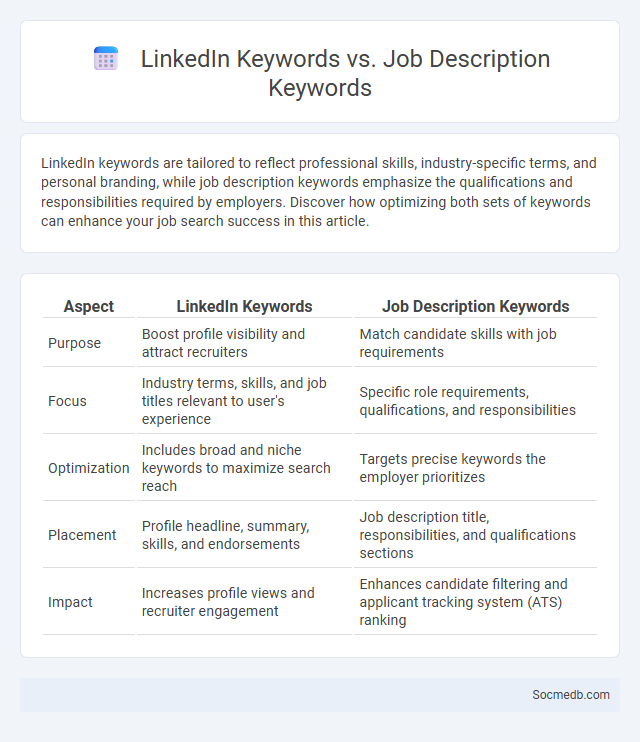
Photo illustration: LinkedIn Keywords vs Job Description Keywords
LinkedIn keywords are tailored to reflect professional skills, industry-specific terms, and personal branding, while job description keywords emphasize the qualifications and responsibilities required by employers. Discover how optimizing both sets of keywords can enhance your job search success in this article.
Table of Comparison
| Aspect | LinkedIn Keywords | Job Description Keywords |
|---|---|---|
| Purpose | Boost profile visibility and attract recruiters | Match candidate skills with job requirements |
| Focus | Industry terms, skills, and job titles relevant to user's experience | Specific role requirements, qualifications, and responsibilities |
| Optimization | Includes broad and niche keywords to maximize search reach | Targets precise keywords the employer prioritizes |
| Placement | Profile headline, summary, skills, and endorsements | Job description title, responsibilities, and qualifications sections |
| Impact | Increases profile views and recruiter engagement | Enhances candidate filtering and applicant tracking system (ATS) ranking |
Understanding LinkedIn Keywords
LinkedIn keywords are critical for enhancing profile visibility and attracting relevant professional opportunities by aligning with industry-specific terminology and job descriptions. Optimizing headline, summary, and experience sections with targeted keywords such as skills, certifications, and roles increases the chances of appearing in recruiter searches and algorithm-based recommendations. Effective keyword integration on LinkedIn fosters stronger networking connections and improves personal branding in competitive job markets.
Decoding Job Description Keywords
Decoding job description keywords on social media platforms enhances targeted job searches and improves applicant tracking system (ATS) compatibility. Identifying relevant keywords related to skills, qualifications, and industry-specific terms increases visibility and matches job seekers with suitable opportunities. Leveraging hashtags and professional groups on LinkedIn and Twitter further amplifies keyword effectiveness in networking and job hunting.
Importance of Keyword Optimization in Job Search
Keyword optimization in social media profiles significantly enhances visibility to recruiters and hiring managers by aligning content with industry-specific terms and job titles. Utilizing relevant keywords in posts, headlines, and skills sections increases the chances of appearing in search algorithms on platforms like LinkedIn, which directly influences job matching accuracy. Strategic keyword use not only boosts profile rankings but also demonstrates a candidate's expertise and relevance in their desired field, making it essential for effective job search strategies.
LinkedIn Keywords vs Job Description Keywords: Key Differences
LinkedIn keywords are tailored to highlight your professional skills, experiences, and industry-specific terminology, optimizing your profile for recruiter searches and networking opportunities. Job description keywords focus on the employer's specific requirements, including technical skills, qualifications, and action verbs that match the role's responsibilities. Understanding the distinction helps You tailor your LinkedIn profile to align closely with job descriptions, increasing your visibility and chances of landing interviews.
How Recruiters Use Keywords to Find Candidates
Recruiters leverage advanced algorithms to scan social media profiles for specific keywords that match the skills, experience, and qualifications they need. Your use of industry-specific terms, certifications, and job titles in posts and bios increases visibility during candidate searches. Optimizing your social media presence with relevant keywords enhances your chances of being discovered by recruiters actively sourcing talent.
Crafting an Optimized LinkedIn Profile
Crafting an optimized LinkedIn profile involves strategically using relevant keywords in your headline, summary, and experience sections to enhance visibility in search results. Highlighting your professional achievements and skills with quantifiable data increases credibility and attracts potential employers or clients. Tailor your profile to reflect your unique value proposition, ensuring Your network recognizes your expertise and opportunities for collaboration.
Aligning Your Resume with Job Description Keywords
Incorporating social media-related keywords such as "content strategy," "social media analytics," and "SEO optimization" into your resume enhances alignment with job descriptions in digital marketing roles. Tailoring language to reflect specific platform expertise like "Facebook Ads," "Instagram Engagement," and "LinkedIn Campaign Management" increases relevance and ATS compatibility. Highlighting measurable achievements, for example, "grew Instagram followers by 35% in six months," reinforces keyword alignment with quantifiable social media performance.
Best Practices for Keyword Optimization
Effective keyword optimization on social media requires thorough research to identify high-traffic, relevant keywords that resonate with your target audience. Incorporate these keywords naturally within your profile descriptions, posts, hashtags, and captions to enhance visibility and engagement. Consistently monitoring keyword performance allows you to refine your strategy and maximize your social media reach while ensuring Your content remains discoverable and impactful.
Tools for Identifying Relevant Keywords
Tools for identifying relevant keywords on social media include platforms like Google Keyword Planner, SEMrush, and Ahrefs, which provide insights into trending search terms and user intent. Social listening tools such as Brandwatch and Hootsuite enable analysis of audience conversations and hashtags to discover popular and niche keywords. Utilizing these tools enhances content strategy by targeting high-impact keywords that drive engagement and increase visibility across social channels.
Common Mistakes in Keyword Optimization and How to Avoid Them
Common mistakes in social media keyword optimization include overstuffing keywords, ignoring user intent, and neglecting long-tail keywords that capture specific search queries. Avoid these by conducting thorough keyword research using tools like Google Keyword Planner or SEMrush, focusing on natural language that matches audience behavior, and integrating relevant long-tail keywords to improve content visibility. Consistently analyzing performance metrics and adjusting keyword strategies ensures better engagement and higher search rankings on platforms such as Instagram, Twitter, and Facebook.
 socmedb.com
socmedb.com